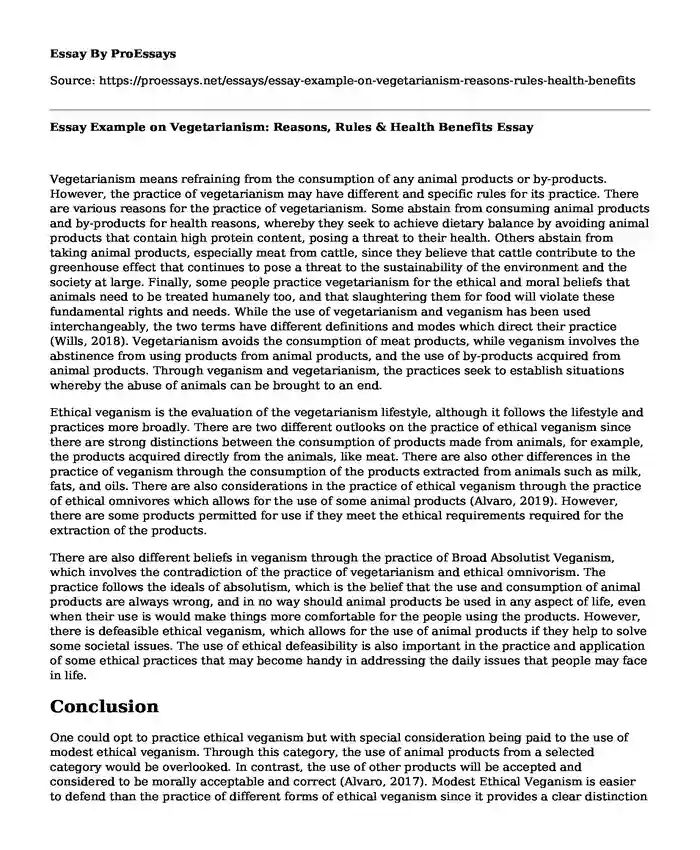Vegetarianism means refraining from the consumption of any animal products or by-products. However, the practice of vegetarianism may have different and specific rules for its practice. There are various reasons for the practice of vegetarianism. Some abstain from consuming animal products and by-products for health reasons, whereby they seek to achieve dietary balance by avoiding animal products that contain high protein content, posing a threat to their health. Others abstain from taking animal products, especially meat from cattle, since they believe that cattle contribute to the greenhouse effect that continues to pose a threat to the sustainability of the environment and the society at large. Finally, some people practice vegetarianism for the ethical and moral beliefs that animals need to be treated humanely too, and that slaughtering them for food will violate these fundamental rights and needs. While the use of vegetarianism and veganism has been used interchangeably, the two terms have different definitions and modes which direct their practice (Wills, 2018). Vegetarianism avoids the consumption of meat products, while veganism involves the abstinence from using products from animal products, and the use of by-products acquired from animal products. Through veganism and vegetarianism, the practices seek to establish situations whereby the abuse of animals can be brought to an end.
Ethical veganism is the evaluation of the vegetarianism lifestyle, although it follows the lifestyle and practices more broadly. There are two different outlooks on the practice of ethical veganism since there are strong distinctions between the consumption of products made from animals, for example, the products acquired directly from the animals, like meat. There are also other differences in the practice of veganism through the consumption of the products extracted from animals such as milk, fats, and oils. There are also considerations in the practice of ethical veganism through the practice of ethical omnivores which allows for the use of some animal products (Alvaro, 2019). However, there are some products permitted for use if they meet the ethical requirements required for the extraction of the products.
There are also different beliefs in veganism through the practice of Broad Absolutist Veganism, which involves the contradiction of the practice of vegetarianism and ethical omnivorism. The practice follows the ideals of absolutism, which is the belief that the use and consumption of animal products are always wrong, and in no way should animal products be used in any aspect of life, even when their use is would make things more comfortable for the people using the products. However, there is defeasible ethical veganism, which allows for the use of animal products if they help to solve some societal issues. The use of ethical defeasibility is also important in the practice and application of some ethical practices that may become handy in addressing the daily issues that people may face in life.
Conclusion
One could opt to practice ethical veganism but with special consideration being paid to the use of modest ethical veganism. Through this category, the use of animal products from a selected category would be overlooked. In contrast, the use of other products will be accepted and considered to be morally acceptable and correct (Alvaro, 2017). Modest Ethical Veganism is easier to defend than the practice of different forms of ethical veganism since it provides a clear distinction on why the consumption of the given category of animals is acceptable for use and why the rest are not.
References
Alvaro, C. (2017). Ethical veganism, virtue, and greatness of the soul. Journal of Agricultural and Environmental Ethics, 30(6), 765-781.
Alvaro, C. (2019). Ethical veganism, virtue ethics, and the great soul. Rowman & Littlefield.
Wills, J. (2018). The INTENTIONAL killing of field animals and ethical veganism. Ethical Vegetarianism and Veganism, 254-264.
Cite this page
Essay Example on Vegetarianism: Reasons, Rules & Health Benefits. (2023, Sep 10). Retrieved from https://proessays.net/essays/essay-example-on-vegetarianism-reasons-rules-health-benefits
If you are the original author of this essay and no longer wish to have it published on the ProEssays website, please click below to request its removal:
- HIV and AIDS Action Plan Essay
- Ethics in Social Work Essay Example
- Essay Sample on The Governing Boards Obligation on Accountability
- Essay on Dealing With Teen Pregnancy: Risks and Responsibilities
- Research Paper on Creutzfeldt Jakob Disease: Signs, Symptoms, Causes, and Diagnosis
- Emergency Preparedness: Key to Effective Response in Emergencies - Research Paper
- Bioethics: A Global Concern for Human Beliefs & Values - Essay Sample







